IJCRR - 13(1), January, 2021
Pages: 121-124
Date of Publication: 05-Jan-2021
Print Article
Download XML Download PDF
Knowledge and Attitude About Organ Donation Among Medical Students: An Observational Study from Aurangabad, Maharashtra
Author: Savita Kadam, Smita Shinde, Gautam Shroff, Suvarna Gulanikar
Category: Healthcare
Abstract:Introduction: Organ donation is life-saving for patients with end-organ failure but unfortunately organs are not available for transplantation due to poor knowledge, attitude, myths and misconceptions towards organ donation. Shortage of organ donation can be solved by increasing awareness regarding organ donation. The present study was conducted in M.G.M. Medical College, Aurangabad, Maharashtra to assess the knowledge and attitude of first-year medical students towards organ donation.
Objectives: To study the knowledge & attitude of first-year medical students towards organ donation. To identify the areas where knowledge was lacking & augmenting the knowledge of that area.
Methods: A cross-sectional study was conducted at M.G.M. Medical College, Aurangabad, Maharashtra by distributing the self\?structured questionnaire to first-year medical students. The data was collected and analyzed statistically after the approval of the Ethics Committee for Research on Human Subjects (MGM-ECRHS/2020).
Results: 130 students had participated in this study after taking informed verbal consent. 98.46% of students knew about organ donation. 53.84% claimed the source of information about organ donation as television and internet while 70.76% claimed as discussion in medical college and 20% as radio. The awareness regarding eye, kidney, skin, heart and liver was 86.92%, 86%, 72.30%, 72.30% and 72.30% respectively.92.30% of students were aware of laws regarding organ donation.
Conclusion: Medical students had a high level of awareness and a positive attitude towards organ donation. However to have in-depth knowledge 'organ donation and transplantation' must be included in the medical curriculum.
Keywords: Awareness, Donor, Transplantation, Dialysis, Brain death
Full Text:
INTRODUCTION
Organ donation is the donation of biological tissue or an organ of the human body from a leaving or dead person to a living recipient in need of transplantation.1 The transplanted organ or tissue may be obtained from patient himself (autograft) or another person (allograft) or any animal (xenograft). The organ donation rate of India is 0.26 per million is poor as compared with America 26, Sweden 35.3 and Groatia 36-5 per million. Organ transplantation is the only treatment for the patient with end-stage organ failure. Many organs of our body can be transplanted such as kidney, cornea, liver, heart, lung, skin, intestine, bone marrow, ligaments. At least seven lives can be saved if one person donates all his organs after death but unfortunately, lakhs of people die waiting for an organ in our country.2
In India, almost 500,000 people die every year due to non-availability of organs. Annually 175,000 kidney patients, 50,000 heart patients, 50,000 liver patients & 1 lakh corneal blind patients await transplant but only 5000, 30, 700 & 25,000 donors are available.3 It is estimated that 1.5 lakh brain deaths occur due to RTA (road traffic accident) & if even 20% of them able to donate, all requirements for organ transplantation in our country would be fulfilled.3 In India 9.5 million deaths occur annually, nearly 100000 deaths are mainly due to organ failure.4
In India awareness of organ donation is very less and hence many people on the transplant waiting list die before the organ is available. The major concerns causing organ shortage in the country are lack of awareness and correct knowledge among public, myths and misconception clouding organ donation due to religious and cultural barriers, etc.5
For chronic kindly disease, dialysis is optional for renal transplant therapy for a short period but liver and cardiac failure patients do not have replacement therapy. Therefore awareness of organ donation is a must. Knowledge & attitude of health care providers for organ donation plays a major role in promoting concept among the population. Medical students are our future doctors hence they are used for promotion of organ donation with correct knowledge. The present study was done to assess the knowledge and attitude of first-year medical students of our college about organ donation.
MATERIALS AND METHODS
A cross-sectional study was undertaken to ascertain the knowledge and attitude of first-year medical students of MGM Medical College. Aurangabad, Maharashtra, about organ donation after taking Ethical committee approval. A self-structured questionnaire was distributed to 130 medical students after taking informed verbal consent. The detailed explanation of all objectives was given to them. Students were also aware of maintaining anonymity and confidentiality. They were also explained that some questions have multiple choices so that they can correct more than one options.
The questionnaire was divided into three parts First part was related to demographic information of respondents. The second part was related to knowledge of respondents towards organ donation and the third part was related with the attitude of the respondent towards organ donation.
Students were strictly instructed that they should solve questionnaire without discussion among themselves. Data were collected and entered in MS Excel sheet and analyzed.
RESULTS
The study was conducted on 130 first-year students of M.G.M. Medical College, Aurangabad, Maharashtra in March 2020. The study population consisted of 70(53.84%) males and 63(46.16%) females. All of them were unmarried and between the age group of 18-21 years. Most of them were of Hindu religion. Very few students had not attempted all questions (Figure 1).
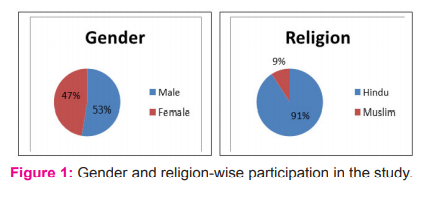
The students had multiple sources of information about organ donation like Television (53.84%), Radio (20%), internet (53.84%), and medical college (70.76%) (Figure 2).
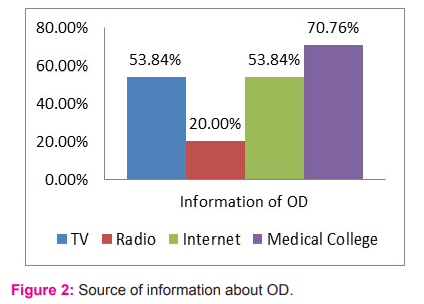
Only 56.92% of respondents were aware that organs can be donated after the age of 18 years (Figure 3).
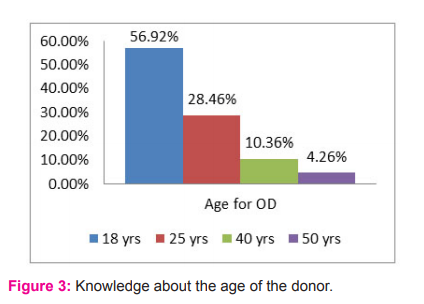
Most of the students (98.46%) were aware of organ donation. They were aware of possible organs to be donated and who can be a possible donor (Figure 4). They have poor knowledge about contraindications of organ donation; only 20.76% students knew that HBsAg (Blood test for active or chronic Hepatitis B diagnosis) positive patients cannot donate their organs whereas 66.92 % students were aware that HIV positive patients cannot donate their organs. 41.53% of students knew that cancer is a contraindication of organ donation. Most of them knew that consent is required for donation of organs both in living donor and after death 84.61% and 86.15% respectively. Respondents were having poor knowledge about the decision of organ donation of unclaimed bodies. According to 60.76% students, doctors from medical college can decide on organ donation of unclaimed bodies followed by a judge (26.92%), police (8.4%) and charitable organization (3.92%).

Knowledge regarding checking of compatibility between donor and recipient was fairly good (96.92%) among respondents whereas knowledge regarding the storage of harvested organ was very poor (56.15%) (Figure 7). Only 46.15 students knew about how to register for organ donation. It was very amazing finding that 73.07% of students were against displaying willingness of organ donation on driving licenses. The reason is ambiguous. 66.92% of respondents were aware of the National Network for organ donation which is present in Aurangabad, Maharashtra. 88.40% respondents also knew that a single donor can donate its organ to multiple donors and 93.20% knew that there are laws for organ donation.
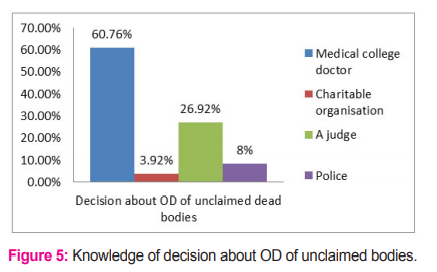
We found that 98% participants had supported organ donation and 67% had a positive attitude towards organ donation and they were willing to donate their organs not only to family members but also to anybody in need. However, 92.30% of students were willing to donate organs to their family only. 88.46% of respondents were ready to motivate their family and friends (Figure 6).
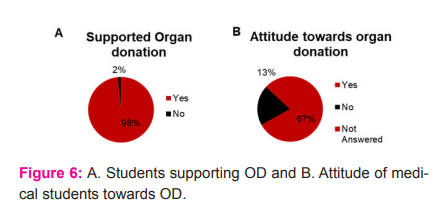
DISCUSSION
Due to the poor rate of organ donation, there is the shortage of organs which limits transplantation programs especially in India where organ donation rate is very low i.e. 0.16 donor per million populations. This is because of lack of knowledge and myths and misconceptions about organ donation. This study was carried out to investigate the knowledge and attitude of medical students towards organ donation.
It was observed that awareness regarding organ donation was 98.48% in our first-year students which is almost equal (98.70%) to students of D.Y. Patil Medical College Pimpri, Pune as studied by Bharambe et al.6 From this, we can conclude that medical students have high awareness regarding organ donation. In our study, it was found that discussion at medical college about organ donation is the main source (70.76%) of organ donation followed by television (53.84%), internet (53.84%) and radio (20%) whereas, in the study done by Bilgel et al.7 only 28.1% students got information about organ donation in medical college, 34.4% from the newspaper, 40.6% from television, 11% from internet and 12.5% got information apart from these sources. Thus, it appears that knowledge of organ donation is enhanced in medical colleges and television and internet are also important sources of promotion of organ donation.
In present study, high level of awareness was observed regarding donation of eye(86.92%),kidney(85.24%),heart(72.30%),liver(72.30%)and skin(72.30%) but low levels(<18%) of awareness regarding other organs like intestine, pancreas, lung, ligaments. This observation was similar to findings by Annadurai et al8 who studied knowledge of non-medical students regarding organs that can be donated and found that 94.3% were aware of eye and 84.55% kidney, 12.73% heart, 1.08% liver and 1.62% lung donations. It suggests that knowledge about organ donation of first-year medical students is the same as non-medical students.
In present study 56.15% students were aware of the method of storage of harvested organs which is quite higher than the study of Nimra Shireen et al2 (25%) and lesser than the study done by Apoorva S and et al(68.65%).3 It suggests that knowledge of the method of storage of harvested organ must be given to all medical students along with the time of interval between harvesting and transplanting the organ.
In our study, 53.84% students did not know about how to register for organ donation which is similar to study done by Mithra et al9 in which 48.50% students did not know how to register for organ donation. This indicates that there is more need for an advertisement about the registration of organ donation.
In this study, only 1.54% of students were not aware of NGO’s work for this task which is very less as compared to study done by Apoorva S et al.3 where she found that only 30.1% were aware of this Nobel task of NGO’s. This shows that the university must revise the present curriculum of medical education and must include organ donation and transplantation in the medical curriculum.
In the present study, 92.30% of students were aware of laws regarding organ donation which is much more than previously reported.10 In the present study, 98.46% of respondents had supported much higher organ donation (82.65%) than the study done by Giri et al.1 In our study, 66.92% of students were strongly ready to donate their organs which is slightly less than the study done by Sanatana et al,11which shows 76.5% students were strongly willing for organ donation. In our study, 88.46% were ready to motivate their family and friends which is very high as compared to study done by G.S. Adithyan and et al in 2017 in Kerala where only 44.3% were strongly willing for organ donation.5 In our study, 1.52% students have not supported organ donation.20% of students were not willing for organ donation which is high as compared to study done by V.K. Bharambe et al (less than 5%)10.
CONCLUSION
To increase in depth knowledge of organ donation in medical students,’ organ donation and transplantation’ must be included in the medical curriculum. The mass media play an important role in spreading awareness about organ donation. As medical students are our future doctors they must have adequate knowledge about organ donation so that they will create awareness and motivate the general public towards organ donation. The medical student had a high-level positive attitude towards organ donation but poor knowledge regarding contraindications of organ donation, method of storage of harvested organs and how to register for organ donation.
ACKNOWLEDGEMENT
Authors acknowledge the immense help received from all the students who participated in this survey. Authors also acknowledge the help received from scholars whose articles are cited in the manuscript. The authors are also grateful to all the editors and publishers of those articles and journals from where the literature of this article has been reviewed.
Source of Funding: NA
Conflict of Interest: Nil
Abbreviations:
RTA-Road Traffic Accident
OD –Organ Donation
References:
-
Giri PA, Yuvaraj BY, Kamble MG, Amarnath B. Solepure .Organ donation and transplantation: knowledge and attitude amongst
Indian undergraduate medical students. Int J Community Med Public Health 2017;4(11):4303-4306.
-
Shireen N, Ansari MW, Indupalli AS, Selladurai S, Reddy SS. Knowledge and Attitude about Organ Donation and Transplantation among Students of a Medical College in Kalaburagi. Int J Community Med 2018; 9(4): 278-282.
-
Apoorva Sindhu, T. S. Ramakrishnan, Anurag Khera, Gurpreet Singh. A Study to Assess the Knowledge of Medical Students Regarding Organ Donation in a Selected College of Western Maharashtra. Med J Dr DY Patil Uni 2017;10(4): 349-353.
-
Chakradhar K, Doshi D, Reddy BS, Kulkarni S, Reddy MP, Reddy SS. Knowledge, Attitude and Practice Regarding Organ Donation among Indian Dental Students. Int J Organ Transplant Med 2016; 7(1): 28–35.
-
GS Adithyan1, M Mariappan2, KB Nayana3 A study on knowledge and attitude about organ donation among medical students in Kerala. Ind J Transpl 2017;11(3):133-137.
-
Vaishaly K. Rathod H, Paranjape VM, Kanaskar N, Shevade S, Survase K, Arole V. Awareness regarding body and organ donation amongst the population of an urban city in India. Nitte University J Health Sci 2015;5(4): 51-57.
-
Bilgel H, Sadikoglu G, Bilgel N. Knowledge and Attitude about Organ Donation among Medical Students. Tx Med 2006;8:91-96.
-
Annadurai K, Mani K, Ramasamy J. A study of knowledge, attitude and practices about organ donation among college students in Chennai, Tamilnadu-2012. Prog Health Sci 2013;3(2): 59-65.
-
Prasanna Mithra1, Prithvishree Ravindra1, B Unnikrishnan1, T Rekha1, Tanuj Kanchan2, Nithin Kumar1, Mohan Papanna1, Vaman Kulkarni1, Ramesh Holla1, K Divyavaraprasad1.Perceptions and attitudes towards organ donation among people seeking healthcare in tertiary care centres of coastal south India. Ind J Palliative Care. 2013;19( 2): 83-87.
-
Bharambe VK, Rathod H, Angadi K. Knowledge and Attitude Regarding Organ Donation among Medical Students. BANTAO J 2016; 14(1): 34-40.
-
Sahana BN, Sangeeta M. Knowledge, attitude and practices of medical students regarding organ donation. Int J Curr Res Rev 2015;7(16):74-77.
|






 This work is licensed under a Creative Commons Attribution-NonCommercial 4.0 International License
This work is licensed under a Creative Commons Attribution-NonCommercial 4.0 International License